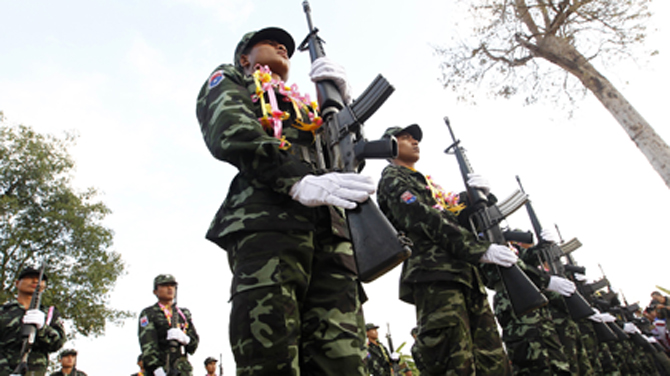With unprecedented intent on display from all of Burma’s major conflict actors to bring an end to hostilities, and two-sided negotiations ongoing with all groups, progress is certainly being made towards peace in Burma.
But with bloody conflict unhalted in the north and continued skirmishes across the east despite new ceasefires, we are yet to see if words can translate into comprehensive action. Even if hostilities are brought to an end, severe political differences will threaten to derail the peace process unless a common strategy to address them can be agreed upon by all sides.
With the exception of the United Wa State Army, and its close ally the Mongla Army, the country’s largest opposition armed forces have demanded the government commits to nationwide political dialogue in return for ceasefires. While the government has agreed in principle, its own three-stage “roadmap to eternal peace” remains starkly at odds with this fundamental demand. So, how successful can this roadmap be, and what are the realistic alternatives being put forward by the ethnic armed groups?
On March 1, President Thein Sein further clarified the basics of the roadmap, as part of his speech to the Parliament. The three stages are to first sign a ceasefire that brings an end to hostilities; second to engage in economic development, work to eradicate drugs, and to assimilate into the state military and political framework; and third to work through the Parliament to “amend the Constitution by common consent so as to address [the government, national races and all citizens’] needs.”
In the case of the ongoing conflict in Kachin State, where the Tatmadaw (armed forces) remains engaged in daily conflict with the country’s second largest armed group, the Kachin Independence Army (KIA), even stage one remains distant.
“There are currently clashes and skirmishes every day in Kachin State between our troops and government troops,” explains La Ja, general secretary of the Kachin Independence Organization (KIO), the KIA's political wing.
“Now, [government troops] are mostly in the northeastern part of Shan State in our 4th Brigade, 8th Battalion area. In Kachin State it is mainly areas east of Myitkyina, in our northern headquarters in the Sittaung area. [There are also government troops on the offensive] farther south in Bhamo, while others are west of the Irrawaddy River in the other special region [areas administered by the KIO for nearly two decades through the 1994 ceasefire agreement with the government].
“The meetings are civil. At the table, Aung Thaung [the government’s head negotiator] speaks very respectfully so the talks go smoothly … but the military’s offensive is now clearly aimed at overrunning our area. They are just aiming to dominate and control the region.”
From the government’s perspective, and indeed at first glance to most observers, it is the KIO that is thwarting the peace process. In successive talks they have refused to sign a new ceasefire as the first step and insist upon immediate political dialogue. However, with no aims to go on the offensive into government territory, and the feeling that their previous 17-year ceasefire gained them very little, the signing of another gestural agreement seems pointless when an end to hostilities depends only on the government pulling back its troops.
“Ceasefires themselves cannot achieve long-lasting peace.” La Ja stressed. “We don’t want to fight but this fighting was started by 'you' encroaching on our territory, so if 'you' withdraw 'your' troops then there will be no clashes and no fighting.”
To show commitment to stage one of the road map, Thein Sein, and the ceasefire delegation should be focusing primarily on its own military, in order to bring troops back out of KIO territory and build trust. Comprehensive action to crack down on human rights abuses on ethnic civilians should also be taken. While routine extortion and destruction of livelihoods continue and regular incidents of extrajudicial killing and sexual abuse are taking place, government demands for the KIO to halt all hostilities are likely to fall on deaf ears.
Farther south, according to David Taw, secretary of the Karen National Union (KNU) Peace Committee, for them also, “the first stage is still not complete. There are many areas where there are still clashes so a ceasefire is not in place yet.” But he remains largely positive saying, “I think it is based on communication. If we can develop good communication, these things won't happen.”
According to anonymous sources in numerous KNU areas, however, tensions are increasing further, primarily due to extensive resupplying by the Tatmadaw on its frontiers, in areas previously isolated by ambushes of the Karen National Liberation Army (KNLA), the KNU's military wing.

